book/daddy: April 2008 Archives
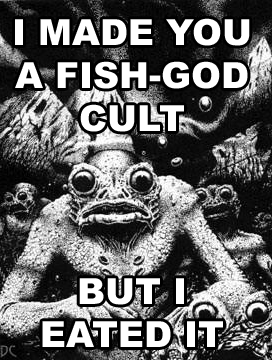
- How can any novel as widely read as The Catcher in the Rye be a "cult book"? L. Ron Hubbard's work is certainly cultish; ditto Ayn Rand's. Ah, but aren't they widely read, too? Of course, but they are completely humorless and consider no perspective to be justified other than their own -- sure signs of the cult mind. After giving up any real attempt at defining a "cult book" -- akin, one suspects, to distinguishing a cult from a sect from a religion -- the Telegraph takes a shot anyway at the "50 best cult books." But ... but The Confederacy of Dunces? In that case, "cult" would seem to mean "beloved novel that, for the fan, was not appreciated widely enough."
- Why, robot, as Isaac Asimov might put it. book/daddy is a little surprised that a review of a book about sex with robots never makes reference to the recent, wonderfully understated film, Lars and the Real Girl. Bianca, "the real girl," may not be an automaton, yet the question of creepiness vs. acceptance is very much the same (as is the "pathetic fallacy," the human need to anthropomorphize the inanimate). And in the film, all of this, surprisingly, is rather sweetly explored. But then, judging from its index, David Levy's Love and Sex with Robots doesn't consider Bladerunner -- or Philip K. Dick at all. Or Kokaku Kidotai (Ghost in the Shell). Or the old TV series, My Living Doll. Not a cultural study, we can say with some certainty. It does make one brief, early reference to Asimov, though -- the author of I, Robot.
- In American culture, we are all thieves, jokers and con artists now. To Lewis Hyde, Hermes is one of the generative figures in culture, a figure "of many shifts, blandly cunning, a robber, a cattle driver." For him, Hermes is "an American hero for 'the land not of natives but of immigrants, the shameless land where anyone can say anything ... the land of opportunity and therefore of opportunists ... Trickster has not disappeared. 'America' is his apotheosis; he's pandemic.'
- Thank goodness. Everyone has finally gotten their story straight. The Bush presidential think tank connected to the Bush presidential library at Southern Methodist University really isn't going to be a blatantly partisan propaganda machine. That might not be good for SMU's academic credibility. Which the school is very keen on leveraging to Ivy League status. But this means SMU has put its future reputation in hock -- to an outfit over which it has no control.
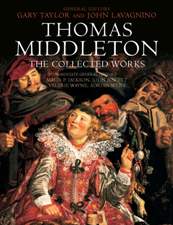 Fifteen years, ago, when book/daddy interviewed Gary Taylor, author of Reinventing Shakespeare and co-editor of the Oxford Shakespeare, Professor Taylor talked eagerly about his desire to resurrect Thomas Middleton as the other great playwright of the English Renaissance, greater even than Christopher Marlowe. He was a writer of some 27 plays most of us have never heard of let alone seen performed yet an artist who went where Shakespeare feared to tread.
Fifteen years, ago, when book/daddy interviewed Gary Taylor, author of Reinventing Shakespeare and co-editor of the Oxford Shakespeare, Professor Taylor talked eagerly about his desire to resurrect Thomas Middleton as the other great playwright of the English Renaissance, greater even than Christopher Marlowe. He was a writer of some 27 plays most of us have never heard of let alone seen performed yet an artist who went where Shakespeare feared to tread.
Prof. Taylor has come out at last with Middleton's Collected Works -- but Jonathan Bate has some problems with his claims:
Taylor wants to have it both ways. On the one hand, Middleton is lauded as "our other Shakespeare", the only dramatist to excel in every genre - a claim that elevates his only surviving historical drama, Hengist King of Kent; or, The Mayor of Queenborough, to a status that it cannot really carry, despite the best endeavours of Grace Ioppolo in the exceptionally well-edited text that she contributes to the edition. On the other hand, Middleton is the great collaborative genius, the counterweight to Shakespeare. In terms of theatrical excellence, his best solo-written city comedies seem to me to be Michaelmas Term, A Trick To Catch the Old One (given especially sympathetic treatment by Valerie Wayne), the well-known Chaste Maid in Cheapside and the underrated Your Five Gallants. But there is little to put between them and his best comic collaborations with Rowley, A Fair Quarrel and The Old Law; or, a new way to please you (the euthanasia comedy which was played so effectively at the RSC a few years ago). The evidence of the new edition suggests that "Middleton and Rowley" ought to replace "Beaumont and Fletcher" as the most celebrated collaborative team of the age, but it is not clear to me how the "and Rowley" part of the equation fits with the image of Middleton as "our other Shakespeare".
Alexander Linklater's cover story in Prospect magazine is the best single feature book/daddy has ever read on Christopher Hitchens -- a thorough tracing of his political arguments, an informed recounting of his family background (and how Hitchens insists it has little to do with his political arguments).
But there's this one, sizable oversight: There's very little on his literary criticism -- except the obvious influence of Orwell. I know, I know -- the big "flashes" in Hitchens' life, the motivating moments that he talks about when his personal insights fuse with historic occasions, have primarily been political. And who cares about novels when we're talking about '68 and the Berlin Wall and 9/11 and the blood and sand of Iraq?
Well, book/daddy cares. Sorry about that. Or actually, no, I'm not. Hitchens' writings on literature, book/daddy would argue, are often more enlightening, more thought-provoking than another one of his polemics insisting that Bush's war in Iraq remains a worthy cause -- a predictable defensive stand for Hitchens to take. But being predictable and defensive doesn't become Hitchens.
In the end, book/daddy would rather read him on Wodehouse than Wahabism.
-
.
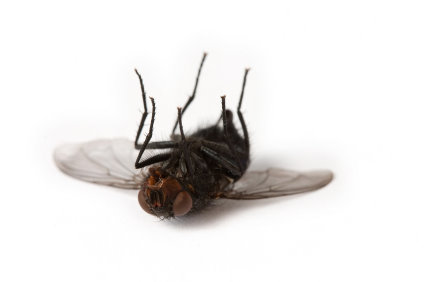 The entertainingly grumpy Bill Bryson, author of Notes from a Small Island, still one of the best-selling books in England, is up in arms over the state of rural England. He's incensed about "fly tipping." Seems there's an absolute epidemic of it; 340,000 incidents last year in Sheffield alone, and only one prosecution.
The entertainingly grumpy Bill Bryson, author of Notes from a Small Island, still one of the best-selling books in England, is up in arms over the state of rural England. He's incensed about "fly tipping." Seems there's an absolute epidemic of it; 340,000 incidents last year in Sheffield alone, and only one prosecution.
book/daddy confesses: He had to look it up. "Fly tipping" means dumping trash illegally -- doing it "on the fly." What book/daddy was imagining involved sneaking up on the sleeping critter, furtively taking hold of one of its tiny legs and carefully turning it over on its back. That way, when the fly awakens, it tries to fly "up" into the floor. Buzzing hilarity ensues.
-
Samuel Beckett wanted to let the chaos in -- even as a lecturer at Trinity College, Dublin. No wonder he didn't stay in academe: "Beckett believed himself to be a poor lecturer; he felt, as he put it, that he could not teach others what he did not know himself. But his students saw things differently. Rachel Burrows, who considered that she had benefited a great deal from his lectures, wished to correct Beckett's disparaging self-image, so she donated her little notebook to her former university."
- "What was later described as the most ill-natured interview ever broadcast can be heard for the first time since 1953." The bilious Evelyn Waugh quizzed on the BBC show, "Frankly Speaking," by three aggressive questioners:
"Asked what failings in others he could most readily excuse Waugh replies quickly: "Drunkenness." Any others? "Em [long pause] ... anger. Lust. Dishonouring their father and mother. Coveting their neighbour's ox, ass, wife. Killing. I think there's almost nothing I can't excuse except perhaps worshipping graven images. That seems to be idiotic."
- In case someone hasn't already e-mailed you the link to it, the Village Voice printed an Official Election-Season Guide to the Right-Wing Blogosphere, complete with portraits by cartoonist Tom Tomorrow. One may certainly object to the names left off the list. And one can question evaluations based on a ratio of 'stupid" to "evil." (Is Michelle Malkin really that much more "stupid" than she's "evil"?). But Roy Edroso's guide is often spot-on. And funny.
Pity he had to read all that stuff, though.
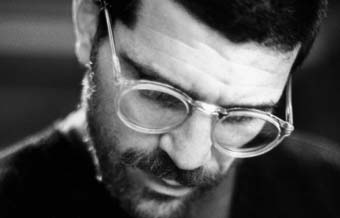
David Mamet was never a doctrinaire lefty -- despite his recent, infamous Village Voice self-description as a "brain-dead liberal" who has come to reject the mentally moribund party line. He has been absolutely hawkish in his support of Israel, for example. His drama Oleanna was attacked by many feminists as a spurious cry of "male victimhood," and he has been a long-time member of the National Rifle Association. It's not that he was some sort of phony liberal; he simply has had a strong moral system that sometimes coincided with Democratic Party principles, and sometimes did not -- as, needless to say, many leftists do. In the '70s and '80s, he wrote brilliant, explosive dramas and film scripts, powered by masculine betrayal and a conviction that American politics and business amounted to a con job or outright theft (Glengarry Glenn Ross, Speed-the-Plow, American Buffalo, Wag the Dog). This made him, at least in his art, more or less liberal: He certainly wasn't pro-business.
But for some time, he has gravitated toward more traditional paeans to integrity and justice and even macho effectiveness -- in the understated classicism of The Winslow Boy and The Voysey Inheritance, for example, or the duty-and-honor militarism of his TV series, The Unit. Essentially, Mamet began by writing bitter moral satires (sometimes still does, given the evidence of Romance and November). But increasingly, he has turned toward expressions of the ideals that he feels are vanishing, if not already absent, from contemporary life. Pointedly, they're the qualities his previous characters lacked or despised.
The typical, Delta Force-style mission in The Unit, it should be noted, is, in effect, a con job or heist -- actions that had once been signs of cynical callousness or desperation in a business office have a moral justification, even a determined enthusiasm, in a war on terror. At the same time, The Winslow Boy and The Voysey Inheritance are actually Victorian tales of stiff-upper-lip, British family honor -- a far cry, it would seem, from his down-and-dirty hoods, near-hoods or soulless yobs. But then, Mamet has always admired professionalism of whatever ilk, even among the salesmen hustlers of Glengarry. Why else did he give Alec Baldwin's bully-boy motivational speaker one of the most memorable monologues in American cinema? These guys have to be good at what they do -- the better to display their moral failings.
Not surprisingly, conservative pundits who crowed over Mamet's party defection generally betrayed their unfamiliarity with anything of Mamet's more recent than the film version of Glengarry Glenn Ross, drawn from a play he penned nearly 25 years ago. Certainly, they don't seem to have read any of his essays.
The recent opening of an adaptation of Shakespeare's Richard III by Dallas' Kitchen Dog Theater got book/daddy thinking about Richard and about Antony Sher's celebrated "Richard on crutches" performance from 1984.
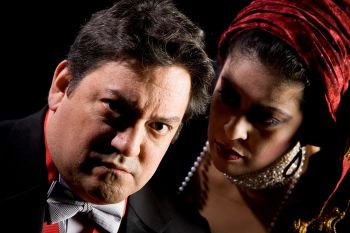 Rene Moreno, who plays the title role in the Kitchen Dog Theater's stripped-down, speeded-up, noisy-fun adaptation of William Shakespeare's Richard III, is actually not the first disabled actor to assay the role of the "poisonous, bunchback'd toad" -- although he may be the first to play him in a wheelchair. (Moreno lost the use of his legs in a 1991 fall and has been acting and directing in Dallas-area theater since 1993.) Last year, for instance, an off-Broadway production starred a physically handicapped actor on crutches -- crutches he needs in ordinary life. (Rene Moreno and Christina Vela in Richard III, above)
Rene Moreno, who plays the title role in the Kitchen Dog Theater's stripped-down, speeded-up, noisy-fun adaptation of William Shakespeare's Richard III, is actually not the first disabled actor to assay the role of the "poisonous, bunchback'd toad" -- although he may be the first to play him in a wheelchair. (Moreno lost the use of his legs in a 1991 fall and has been acting and directing in Dallas-area theater since 1993.) Last year, for instance, an off-Broadway production starred a physically handicapped actor on crutches -- crutches he needs in ordinary life. (Rene Moreno and Christina Vela in Richard III, above)
Essentially, this interpretation of Shakespeare's tyrant -- Richard III as Josef Goebbels, as the "vicious cripple" -- can be traced back to Antony Sher's famously shocking 1984 interpretation for the Royal Shakespeare Company, a performance best encountered these days through Sher's own diary and sketchbook about his experiences, Year of the King (released in 2006 in a new, 20th anniversary edition). Early in his fashioning of Richard in rehearsals -- an attempt to get around what he thought was Laurence Olivier's "definitive" film performance -- Sher realized that
I've never seen anyone play Richard's pain, his anger, his bitterness, all of which is abundant in the text .... It seems to me that Richard's personality has been deeply and dangerously affected by his deformity, and that one has to show that connection.
The pain is plain in the Kitchen Dog's first scene, when Richard delivers his "winter of our discontent" soliloquy, hailing his brother King Edward's coronation.
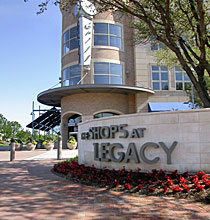 Actually, in Plano. Oh well. But still, book/daddy does mean big -- it's the biggest independent to open anywhere in years. Fireworks and dancing in the streets will be considered for later.
Actually, in Plano. Oh well. But still, book/daddy does mean big -- it's the biggest independent to open anywhere in years. Fireworks and dancing in the streets will be considered for later.
The developer of the six-year-old Shops at Legacy had wanted a bookstore, couldn't get Borders, but found Terri Tanner instead -- a veteran of both Borders and Barnes & Noble. Ms. Tanner is taking over a three-level, 24,000-square-foot space in the shopping center on the Dallas North Tollway, with the building to be designed by architect Morrison Seifert Murphy. Ms. Tanner is modeling Legacy Books on several of the classic successes among independent booksellers in the country, such as BookPeople in Austin and Elliott Bay in Seattle.
The opening will be in late summer.
For those who think, big deal, I get my books on Amazon and aren't e-books the real future....
- book/daddy knew a newspaper editor who argued all semi-colons are affectations and should be removed; the clauses they yoked should be divorced and set up to live in separate sentences. The French fear he may be winning.
- Best. Solution to Shakespeare's identity. Ever.
- Junot Diaz wins the Pulitzer for a book/daddy pick from last year: The Brief Wondrous Life of Oscar Wao.
Next up: the Atlantic runs a cover story on how women's hot flashes are responsible for global warming. Especially successful women's hot flashes. And women without children. And successful, attractive women without children who didn't hop into bed with us. What's the matter with these women?
For the Hag's little aria of well-earned scorn: Brava. You may well eclipse Jessa Crispin as our favorite, delightfully crabby female litblogger.
